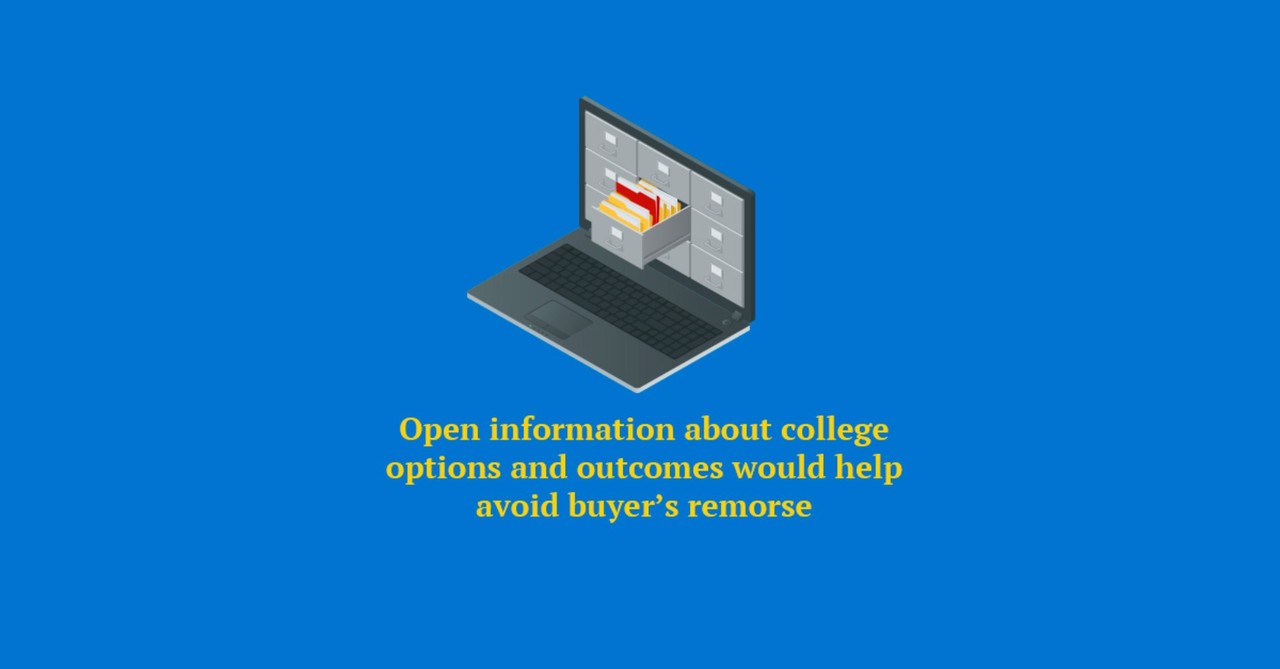
Open information about college options and outcomes would help avoid buyer’s remorse
Whether it’s a used car that turned out to be a lemon or exercise equipment now gathering dust, we have all suffered buyer’s remorse. The inaugural Education Consumer Pulse survey from Strada Education Network and Gallup shows that the same kind of regret extends to college. Americans who completed a credential or degree do not regret going to college, but they wish that they had done some things differently—especially picking a different field of study.
The level of regret is surprising, not only because it is so widespread, but because of the investment involved. College is one of the most expensive choices any of us will ever make. It’s no wonder that customers want more information about how good their degree will be, and how they will be able to use it. As we have been saying for years, consumers deserve this kind of information.
Take a closer look at the Education Consumer Pulse survey and you will find, among other things:
- Given a chance to do it over again, 36 percent of the 90,000 respondents would have chosen a different major, 28 percent would have attended a different college, and 12 percent would have pursued a different degree.
- More than half of respondents regretted at least one of these three decisions.
- Postgraduate completers are the least likely to have regrets about choice of major or any decision they made. Interestingly, graduates who chose STEM majors, especially at the associate and bachelor’s degree levels, are the least likely to have regrets about their field of study.
- The respondents do not regret going to college. More than 80 percent of respondents, no matter the credential they received, agreed that they received a high-quality education.
In our transforming economy, at least 65 percent of future jobs will require a college credential of some sort. The major a person chooses will have lifetime economic consequences.
The variety of postsecondary credentials has rapidly expanded in recent years, with a mix of degrees, certificates, certifications, licenses, badges, and other micro credentials. New providers, delivery modes, and models, such as online and competency-based education, have added further to the growing complexity and confusion. This translates into a bewildering array of decisions and ample opportunity for second thoughts upon making a poorly informed choice.
Colleges are a public good. But for too long, they have hidden behind third-party ratings systems and opaque metrics, like the percentage of professors with terminal degrees. The only antidote is sunshine. Information on earnings outcomes is largely unavailable nationally or college-by college. The College Scorecard launched in 2015 was a big step forward and many states have been building longitudinal data systems that connect education and workforce data. But we need a comprehensive consumer information system that provides program-level data, so that students make better decisions.
We applaud research like this survey. Importantly, the respondents recognized the importance of college and laud the education they got. It is time for colleges to stand up to the important place they occupy in ensuring the future — they should be willing to openly talk about the outcomes of the people who get their product. It won’t hurt them. It will only help us.
Follow Georgetown University Center on Education and the Workforce on Twitter, (@GeorgetownCEW), LinkedIn, and Facebook.
Dr. Carnevale is Director and Research Professor of the Georgetown University Center on Education and the Workforce, an independent, nonprofit research and policy institute affiliated with the Georgetown McCourt School of Public Policy that studies the link between education, career qualifications, and workforce demands.
Associate Professor, Community College Leadership at Mississippi State University
6yThis cannot happen soon enough. Great article.
Retired. at Fox Valley Technical College
6yBy far the students best options are to get a Technical Diploma or Associate degree. After that they can hold down a steady job with a great income. Then one class at a time they can work on completing a Bachelors degree. In seven or eight years when they complete their bachelors degree they will be "education debt" free and now are in the perfect position for a promotion into upper management.